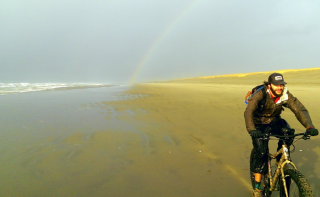
(Photo via Travel Oregon)
This week’s Monday Roundup is brought to you by the first annual Bike Peace Music Festival, a full weekend (July 17-18) of biking, food and live music in the Columbia River Gorge!
Here are the bike links from around the world that caught our eyes this past week:
Fatbiking the coast: Oregon’s, that is. The Path Less Pedaled has seven tips for the trip.
Protected intersections: American bike plans of the early 1970s called for pseudo-Dutch treatments of bike lanes and intersections, but the Federal Highway Administration was persuaded (with no evidence) that Americans wouldn’t understand them.
Leave little trace: Of course mountain biking impacts trails, writes Singletracks.com. But there are perfectly reasonable ways to minimize trail damage.
Unprepared drivers: In a 35-minute simulation that includes 22 variations of the most common ways teen drivers crash, 43 percent of newly licensed teens crashed at least once.
Rails to trails: CityLab has a new-fangled HTML timeline of the history of the movement.
Washington transpo bill: Olympia’s bundle of highway expansions, bikeway funding and transit allowances has been OK’d by the state House but its ban on a low-carbon fuel standard is making progressives uncomfortable.
Female mechanics: “Customer, in response to advice by Georgina: ‘Are you sure?’ Georgina: ‘Shall I get one of the guys to tell you?'” And other painful moments from wrench life.
Advertisement
Bike sabotage: Why do people drop tacks and string wires on bikeways? The Guardian tallies horror stories but doesn’t find an answer.
Breaking the law: Why do people bike through stop signs? Why do people in cars speed? Science Friday looks into it.
Data warrior: Former NYC transportation boss Sadik-Khan joins a FiveThirtyEight podcast.
Vision 30,000: American roads are by far the most dangerous in the developed world, The Economist explains, mostly because of states in the southeast and interior west.
Bus fatalities: The rhetorical war between NYC’s transit union and its street-safety advocates keeps getting uglier. At issue: whether police should be able to arrest bus operators involved in collisions.
Vision Zero: Ann Arbor, Mich.; Fargo, N.D.; and Provo, Utah all have populations of about 115,000 and all saw zero traffic fatalities for at least one recent year.
If you come across a noteworthy bicycle story, send it in via email, Tweet @bikeportland, or whatever else and we’ll consider adding it to next Monday’s roundup.


